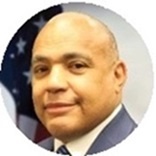The IRS “Lifting Communities Up” initiative is making a profound difference for the taxpayers it serves, its employees and the people living in the Mississippi Delta region.
Get to know the IRS, its people and the issues that affect taxpayers.
By Kevin Q. McIver, Executive Director, IRS Lifting Communities Up (LCU) Initiative
CL-24-01, September 17, 2024
At the IRS, we interact with and serve people throughout the nation from various economic, ethnic, geographic and cultural backgrounds. To be successful in our mission to provide quality service to all taxpayers, we’re committed to having a workforce that reflects the diverse communities we serve.
So, under the direction of then-IRS Commissioner Chuck Rettig in 2022, the IRS launched a “Lifting Communities Up” initiative to not only create a more diverse workforce, but to also provide long-term federal employment opportunities and economic growth in underserved communities outside of Washington, DC. I’d like to give you A Closer Look at this initiative and our plans for the future under Commissioner Danny Werfel. During his recent visit to the Delta, Commissioner Werfel articulated a clear link of this effort to the IRS’s ongoing transformation and commitment to tax education and access in underserved communities. He expressed strong support for the agency’s work in the Delta and appreciated the support from the local community that led to Lifting Communities Up’s current state.
After his visit, Werfel reflected on his time in the Delta: “This was one of the more meaningful days of my government career. Seeing firsthand the positive impact the IRS can have on a local community was inspiring. And meeting the community leaders and IRS employees working to make this a reality reminded me that public service at the IRS can be more than the day-to-day work we do to administer the nation’s tax system. It’s also about making local communities stronger.”
In partnership with community leaders and federal and local government officials, the IRS began assessing locations for a pilot site and in 2022, we selected the northern Mississippi Delta Region. Why the Mississippi Delta? According to the U.S. Census Bureau, this region has the highest rate of poverty (19.58%) in the United States, excluding the U.S. territories, and the highest concentrations of Earned Income Tax Credit (EITC) claims that provide low-wage earners financial support. Another reason we chose this region was that our site research identified an opportunity to use existing unused government space in Clarksdale, Mississippi that was available.
In February of 2022, we opened an Automated Collection System (ACS) call-site in Clarksdale with a team of approximately 12 contact representatives, including a team lead and manager selected internally who provided IRS cultural norms and continuity from the outset. The pilot team in Clarksdale enabled us to assess the level of interest in our jobs and gauge the feasibility of attracting qualified applicants to increase our hiring pool.
The entire IRS leadership team and our agency offices came together to support this important initiative. We conducted a robust recruitment campaign that included posting jobs on the Mississippi Unemployment web page, passing out flyers at community colleges, hosting career fairs and holding a series of virtual information sessions about the contact representative positions. More than 500 people participated in the virtual events.
Based on the initial success of the pilot in Clarksdale, we’ve already expanded our operations there. To date, we’ve hired 27 employees and two contractors in the office, generating an economic impact of approximately 2.4 million annually through salaries and benefits. Further, the Clarksdale post of duty is being renovated, and the IRS working to hire more than 40 new employees this fall.
But it’s not just about hiring employees. We’re also making other investments in the Delta region to create a pipeline of future skilled employees and job opportunities for them to pursue. We’re partnering with local high schools to incorporate IRS Volunteer Income Tax Assistance programs in their educational curriculum to help students learn about IRS and available jobs, including acquiring tax law knowledge that will help them over the course of their lives.
Given the success of the initial effort in Clarksdale and the lessons we learned along the way, we expanded our operation to three other cities in Mississippi. A cornerstone of the expansion was to identify available federal or other office space in the selection process to accelerate our ability to get an office up and running. In 2023, we opened a Taxpayer Assistance Center in Greenville with 13 employees to date who provide in-person tax assistance. We expect more hires there in the future. And two other sites are currently in the works. In Stoneville, we’ve identified federal shared office space in the USDA Research Center. And in Cleveland, working with the General Services Administration, we acquired a facility on the Delta State University campus that we plan to occupy in 2025. This is an innovative approach for us and allows for a unique recruiting opportunity for the IRS, representing a win-win for the IRS and Delta State.
An effort like this could not be successful without the support of local communities and elected officials. I’ve met so many wonderful people across the Mississippi Delta, and I can’t thank them enough for their insights, partnership and support. The IRS especially appreciates the members of the Mississippi Delta Coalition that was created in 2021. In addition to our employees, the coalition includes executives from the U.S. Department of Health and Human Services and the U.S. Department of Agriculture, the office of Congressman Bennie Thompson as well representatives from the Mississippi Department of Human Services and the South Delta Planning & Development District’s Workforce Division. We also appreciate the support from the county and city governments in the area as we worked to establish offices and recruit employees.
I believe our work in Mississippi is having a profound impact on and making a difference for the taxpayers we serve, our employees and the people in the Delta region. We’re committed to our partnership in Mississippi, and I’m excited to build upon the foundation created there as we look at other areas of the country facing similar economic and employment issues to replicate this model. We’re all in this together, and together, we can do great things for communities and taxpayers, whether in the Delta or throughout the nation.
Kevin Q. McIver
Executive Director, IRS Lifting Communities Up (LCU) Initiative
About the author
Kevin Q. McIver is the Project Director of the IRS Lifting Communities Up initiative. During his IRS career, he has also served as the IRS Human Capital Officer, the IRS Chief of Staff for Commissioner Charles Rettig and in other Human Capital roles. Kevin retired from the U.S. Air Force after 21 years of service in the security forces.
Subscribe
The IRS offers several e-News subscriptions on a variety of tax topics. Subscribe to get email alerts when new content is posted.
A Closer Look
Read all our posts about a variety of timely issues of interest to taxpayers and the tax community

 )
or https:// means you've safely connected to the .gov website. Share sensitive information only on official, secure websites.
)
or https:// means you've safely connected to the .gov website. Share sensitive information only on official, secure websites.



